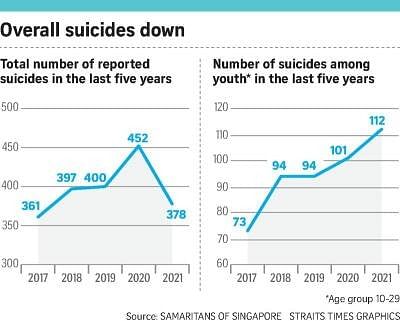SINGAPORE - The number of suicides among youth aged 10 to 29 hit a record high of 112 cases in 2021, up by 11 cases from the year before.
A spokesman for suicide prevention non-profit Samaritans of Singapore said that the number of suicide cases last year among those in this age group was the most reported since the Samaritans' earliest recorded data in 2000.
The last time there was a spike in the number of cases reported was in 2015, when 106 cases were recorded among those aged 10 to 29.
The rise in suicide among youth comes against the backdrop of an overall fall in the total number of reported suicides last year. It fell to 378, down 16.3 per cent from the figure for 2020.
Figures from the Samaritans also showed that suicide deaths among those aged 60 and above also declined, from 154 two years ago to 112 in 2021.
In a media statement on Friday (July 1), the Samaritans attributed this to efforts by the authorities - together with the mental health sector and the community - to prioritise mental well-being and suicide prevention in the light of the impact of the Covid-19 pandemic on mental health.
The Samaritans chief executive Gasper Tan said the overall decrease in number was encouraging, noting that more people are seeking help.
He said: “The data shows an overall decrease and is deeply encouraging, a trend we hope will continue. We must, however, not be complacent in our efforts to support individuals in distress, as we continue to see more individuals reaching out for support.
He added: “Comparing 2020 to 2021, our crisis hotline has seen a 127 per cent increase in calls from youths aged 10 to 19, expressing a strong cry for help that cannot be ignored.”
About one in three cases of suicide last year was among youth aged 10 to 29, as suicide continues to be the cause of the most number of deaths among those in the age group.
Globally, suicide is the fourth leading cause of death among 15- to 19-year-olds, according to the World Health Organisation.
In a statement in June 2021, the global health watchdog said that more than 700,000 people die due to suicide every year.
Mental health experts, parents and counsellors The Straits Times spoke to said there was an urgent need to tackle the stressors affecting youth brought on by the pandemic, including social isolation, financial stress and educational challenges.
Dr Jared Ng, senior consultant and chief of the Institute of Mental Health’s Department of Emergency and Crisis Care, said: “Young patients we encountered have been reporting various stressors in their lives, such as interpersonal issues with their family and friends, academic stress, achievement stress and future job stress.”
Preventing youth suicides requires coordination among various sectors - such as education, social services and health - as well as support and guidance from family members and friends, Dr Ng said.
Secondary school counsellor Vickineswarie Jagadharan said that the pandemic had presented unique challenges to youth, shutting off their avenues to socialise with friends and causing them to seek greater validation on social media.
“Students were also worried about the disruption in their studies and coping with the curriculum at a time they could not ask questions face to face. While home-based learning presented opportunities for families to bond, it also could have resulted in greater friction among parents and children who have differences and were in close quarters,” she added.
Madam Vickineswarie, who lost her son to suicide in 2015, said parents could look out for signs that their child is struggling with mental health.
If a child who is normally cheerful suddenly becomes quiet and withdrawn, this could be a sign that something is not right. Friends can also observe what their peers post on social media, and look out for any content that points to mental health concerns, she said.
She added: “Teachers, counsellors and parents should be focused on helping children build resilience so they can take on challenges in life. While there is more awareness about mental health than before, we should take steps to further normalise youth seeking help for their mental health just as they do for their physical health.”
Introducing mental health awareness in the school curriculum and promoting youth mental well-being have been the focus of advocacy groups such as PleaseStay, set up by six bereaved mothers who lost their children to suicide.

Ms Valerie Lim, one of the members of PleaseStay, said schools could consider increasing the number of counsellors to serve students and reducing class sizes so teachers would be able to better engage children on an individual basis.
Dr Joseph Leong, a board member of charity Caring for Life with 22 years of experience as a psychiatrist, said Covid-19 has exacerbated the challenges faced by youth in their formative years.
Social isolation, financial stress and academic expectations were some of the reasons youth’s mental health could be negatively affected, he added.
Dr Leong said the work of organisations such as Caring for Life, which takes on a community approach to suicide prevention, could be a step forward in addressing youth mental health concerns.
“Peer groups play a big part in helping individuals overcome the stigma stopping them from discussing their challenges and seeking help. Training members in the community enables them to extend help to their friends, family and neighbours, and connect them to the right resources,” he said.

